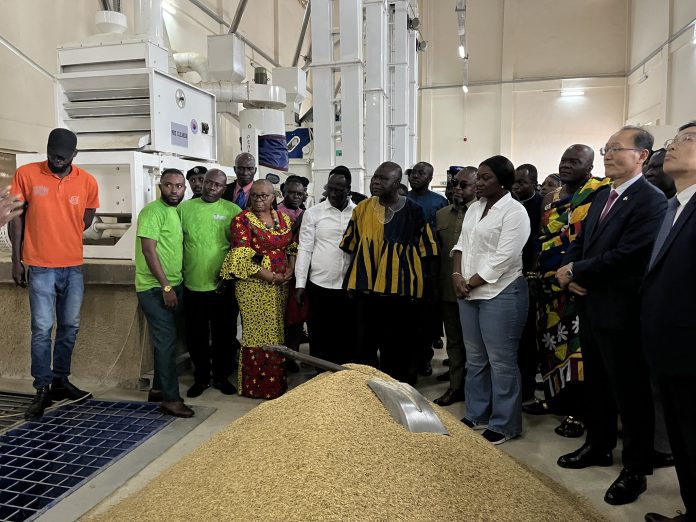A project has been launched, to boost rice production and enhance improvement in the crop’s value chain in Ghana’s middle-belt ecological zone.
The “Enhancing the Competitiveness of Rice Production, Processing and Marketing in Ghana” project is an initiative of a consortium comprising the John A. Kuffuor Foundation, Hopeline Institute and FarmWallet Limited.
The three-year project (2025-2027), seeks to address key constraints in the rice value chain, including low crop yields, poor farming practices, limited adoption of productivity-enhancing technologies, and poor access to essential services mainly finance, mechanisation and quality inputs.
The project with funding from the Alliance for Green Revolution for Africa (AGRA) would ensure an increase in average yields, from the national average of 2.5 – 3.5 metric tonnes per hectare, to 4.5 metric tonnes per hectare.
Again, the project would help improve business skills for small and medium enterprises and increase access to finance for all value chain actors.
Market channels for rice output and strengthened linkages between producers and buyers would also be enhanced, while increasing consumer awareness and preference for local rice, leading to higher demand.
The Ministry of Food and Agriculture (MOFA) had indicated that local rice production in Ghana currently met only 47 per cent of the national demand of 1.5 million metric tonnes.
It said the significant deficit had led to heavy reliance on imports, hindering the country’s economic and food security.
The gap in Ghana’s rice competitiveness spans from low local production, poor access to services (finance, mechanisation, extension services), limited access to structured markets, quality and costs to policy and climate challenges.
Despite investments in policy development, effective implementation remains a barrier and industry is also highly vulnerable to climate-related shocks like severe droughts.
The implementing partners would be performing specific tasks where the John Agyekum Kufuor Foundation (JAKF) will focus on policy, advocacy, and governance.
The Foundation’s activities would include improving policy implementation, stakeholder engagement, and coordinating national and regional rice development strategies.
The Hopeline Institute would serve as the value chain facilitator for farmer mobilization, training, and technology adoption while the FarmWallet Limited acts as the Fintech and IT applications partner, building technical financial linkages.
Mr Godfrey Appiah Acheampong, the Acting Ashanti Regional Director of Agriculture, at the inception meeting of the project, pledged the Department’s readiness to support the project’s full implementation.
He said MoFA would do so by training the farmers through demonstration farms, marketing techniques, among others.
He urged rice farmers to own the project and expand their production capacities.
The meeting brought together rice farmers and processors, agricultural and crop officers from selected districts in the Ashanti Region.
GNA









